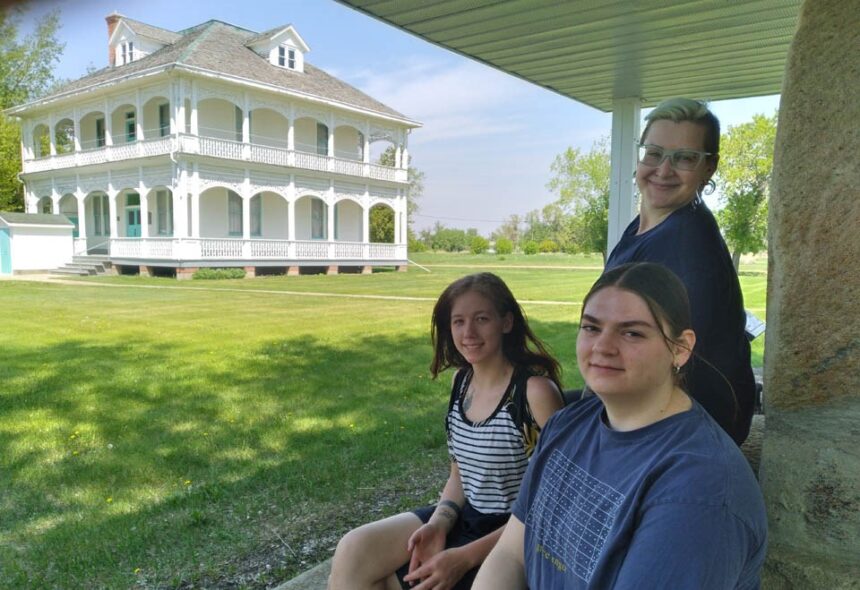The morning dew still clings to wildflowers as I step onto the grounds of the Doukhobor Heritage Village near Veregin, Saskatchewan. The early sunlight catches on the white-painted walls of the prayer home, its simplicity a deliberate testament to the values of those who built it over a century ago.
“We don’t just preserve buildings,” explains Elena Popoff, a third-generation Doukhobor who has volunteered at the heritage site for nearly two decades. “We’re keeping alive a way of thinking about community and peace that feels more relevant than ever.”
The Doukhobors—whose name translates roughly to “spirit wrestlers”—first arrived in Saskatchewan in 1899, fleeing religious persecution in Russia. Their pacifist beliefs and communal lifestyle ran counter to imperial demands, particularly their refusal to serve in the military. Today, their legacy continues through this meticulously maintained 13-acre historical site that serves as both museum and living cultural center.
Walking between the original buildings—the communal kitchen, blacksmith shop, barn, and prayer home—I’m struck by how these structures embody their builders’ values. The architecture is practical yet dignified, emphasizing function and community over individual expression or ornamentation.
Inside the prayer home, Elena shows me where generations gathered for worship without clergy or religious icons. “The Doukhobors believed God exists within each person,” she explains, running her hand along a simple wooden bench. “They rejected church hierarchy and military service because they saw everyone as equal, all containing that divine spark.”
This philosophy cost them dearly. When they burned their weapons in protest against militarism in 1895, Tsarist authorities responded with brutal persecution. Around 7,500 Doukhobors ultimately fled to Canada with assistance from writer Leo Tolstoy and Quaker supporters in England and America, according to records from the Saskatchewan Archives Board.
The Canadian government initially welcomed these industrious farmers, granting them block settlements and exemptions from military service. But cultural misunderstandings and changing government policies soon created new tensions, particularly around individual land ownership, which contradicted Doukhobor communal values.
“My grandfather used to say they came to Canada for freedom, but found they had to fight for it all over again,” says Michael Kalmakoff, whose ancestors helped establish the original Doukhobor settlements. “Many refused to sign individual land papers and lost their farms, then had to start again.”
By the 1920s, the community’s National Doukhobor Village at Veregin became their spiritual and administrative headquarters. The site that remains today includes structures that once housed community leaders, administrative offices, and facilities for producing food and goods for their network of villages.
What makes this heritage site particularly valuable is how it contextualizes the Doukhobor experience within Canada’s complex history of immigration and assimilation. While their pacifist stance has found greater acceptance in modern times, their commitment to communal living and rejection of materialism still challenges mainstream Canadian values.
“People are surprised when they learn that Doukhobors were imprisoned in Canada for their beliefs,” says Dr. Ashleigh Androsoff, a historian at the University of Saskatchewan who specializes in Doukhobor history. “Between 1929 and 1932, over 600 Doukhobors were imprisoned for public nudity, which was actually a form of spiritual protest against government interference in their communities.”
The heritage village doesn’t shy away from these difficult chapters. Interpretive displays explain how some Doukhobors, particularly the Sons of Freedom sect, engaged in protest actions that included burning their own possessions to reject materialism—actions sometimes misunderstood by their neighbors and authorities.
But the site equally celebrates the community’s positive contributions: their agricultural innovations, handicrafts, and especially their distinctive a cappella choral music. During my visit, a group of elders demonstrates these harmonies, their voices filling the prayer home with melodies that have been passed down through generations without written notation.
“The songs contain our philosophy,” explains choir leader Nina Strelioff. “They’re about living peacefully, sharing with others, respecting the earth. We don’t need instruments because the human voice was seen as the purest expression of spirituality.”
Today, fewer than 2,000 people in Saskatchewan identify as Doukhobor, according to Statistics Canada data. Many younger generations have integrated into mainstream society while maintaining aspects of their heritage through food traditions, music, and community gatherings.
The heritage village has responded by evolving into a cultural education center that hosts school groups, researchers, and tourists. Annual events like the Doukhobor Bread and Salt Festival draw visitors from across Canada and descendants from Russia, where there’s renewed interest in Doukhobor history.
“We’re finding that our message of peaceful resolution to conflict is something people are hungry for,” says Popoff. “Visitors come curious about folklore or old buildings but leave thinking about how to build better communities today.”
As climate change and global conflicts intensify, there’s growing interest in the Doukhobors’ environmental stewardship and pacifism. Their historical practices of sustainable agriculture, food preservation, and communal resource-sharing offer practical lessons for contemporary challenges.
Before leaving, I join volunteers for a meal of traditional Doukhobor cuisine—borshch (vegetable soup), piroshki (stuffed buns), and fresh bread with honey. The recipes, like everything else here, have been preserved through generations of communal meals and oral tradition.
As we break bread together, I’m reminded of what Elena told me earlier: “The buildings are just vessels. What we’re really preserving is a way of seeing the world—where peace isn’t just the absence of conflict, but actively created through how we live together.”
In a world increasingly divided, this humble heritage village in Saskatchewan offers more than a glimpse of the past. It presents an alternative vision of community that continues to challenge and inspire visitors long after they’ve left its grounds.






